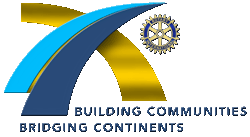By Jennifer Lee Atkin
Rotary International News -- 7 January 2010
RI President-elect Ray Klinginsmith believes Rotary coordinators will provide a vital link between RI and clubs.
Rotarians will soon gain a new resource – someone who will be well-versed in the many programs of Rotary International and knowledgeable about Rotary club and district best practices.
That new resource will be a Rotary coordinator (RC).
“We want clubs to be assured that they are the most important thing in Rotary,” says RI President-elect Ray Klinginsmith, who championed the RC program. “If we don’t take care of the clubs, the clubs won’t take care of Rotary International.”
Adopted by the RI Board of Directors at its November meeting, the program will launch on 1 July. Klinginsmith is appointing the initial 41 RCs, who will serve the same geographical regions as the regional Rotary Foundation coordinators (RRFCs), with at least one RC serving each Rotary zone.
“RCs will be people who have senior leadership experience and a good, strong background in Rotary,” says Duane R. Sterling, a member of the Rotary Club of Warrensburg, Missouri, USA, and Rotarian coordinator for the 2010-11 RI president. Many RCs will be former RRFCs and past regional Rotary International membership coordinators, Sterling says. “They already know the territory,” Klinginsmith adds.
Similar to RRFCs
Just as RRFCs are knowledgeable about The Rotary Foundation’s programs, RCs will be a resource when it comes to multiple aspects of Rotary International and its programs, providing a vital link of communication between RI senior leaders and Rotary clubs.
RCs will focus on offering guidance and tools in three areas: RI programs such as the youth programs, Rotary Fellowships, and Rotarian Action Groups; best practices that strengthen clubs and districts such as strategic planning, effective public relations, and leadership development; and building membership through stronger clubs and districts.
Through their work, RCs will support the three priorities of the RI Strategic Plan: support and strengthen clubs, focus and increase humanitarian service, and enhance public image and awareness. Clubs will also find RCs to be a valuable resource in determining how to meet the annual requirements for the Presidential Citation, Klinginsmith says.
In addition, RCs will assist at Rotary institutes, governors-elect training seminars, and other zone-level meetings. They may also plan and conduct district and regional seminars and workshops where needed, with the assistance and support of district leaders.
Because they will operate in the same geographical areas, RCs and RRFCs will be able to work closely with each other, as well as with the RI director for the zone, Klinginsmith notes.
Moving forward, RCs will be appointed by the RI president-elect and serve three-year terms. Appointees will attend a March institute to prepare for their new role.
Also in November, the Board amended the Rotary Code of Policies to create the RC program and dissolve the RRIMC program, effective 1 July.
http://www.rotary.org/en/MediaAndNews/News/Pages/100107_news_rotarycoordinators.aspx
Note: Effective July 1, the RRIMC positions will go away; the job of this new position of Rotary Coordinator will be to work with the districts to “produce stronger and more effective clubs” – which in turn, should greatly affect membership!
Zone 25 RC will be PDG Judi Beard-Strubing, D5110
Zone 26 RC will be PDG Don Kremer, D5230

No comments:
Post a Comment